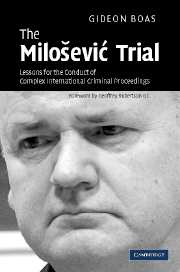Book contents
- Frontmatter
- Contents
- Foreword
- Preface
- Introduction
- 1 FAIR AND EXPEDITIOUS INTERNATIONAL CRIMINAL TRIALS
- 2 THE MILOŠEVIĆ PROSECUTION CASE – GETTING OFF ON THE WRONG FOOT
- 3 CASE MANAGEMENT CHALLENGES IN THE MILOŠEVIĆ TRIAL
- 4 REPRESENTATION AND RESOURCE ISSUES IN INTERNATIONAL CRIMINAL LAW
- 5 CONCLUSIONS
- Index
1 - FAIR AND EXPEDITIOUS INTERNATIONAL CRIMINAL TRIALS
Published online by Cambridge University Press: 18 February 2010
- Frontmatter
- Contents
- Foreword
- Preface
- Introduction
- 1 FAIR AND EXPEDITIOUS INTERNATIONAL CRIMINAL TRIALS
- 2 THE MILOŠEVIĆ PROSECUTION CASE – GETTING OFF ON THE WRONG FOOT
- 3 CASE MANAGEMENT CHALLENGES IN THE MILOŠEVIĆ TRIAL
- 4 REPRESENTATION AND RESOURCE ISSUES IN INTERNATIONAL CRIMINAL LAW
- 5 CONCLUSIONS
- Index
Summary
Introduction
This chapter analyses the key principles of fairness and expedition, by which all international criminal trials are to be conducted, and which are defined in the constitutional instruments and the relevant jurisprudence of the major international criminal tribunals. The ICTY, as the richest source for the development of these principles in international criminal law, will be the main focus of the analysis, although appropriate reference will be made to other courts and tribunals applying them and to their origin and context in international human rights law. In analysing these principles of fairness and expeditiousness, criteria will be identified for determining what constitutes fairness and what constitutes expedition in complex international criminal trials, as well as explaining how these concepts interact and, on occasion, conflict. This problem is not new to international criminal law. Sixty years ago, Lord Wright, Chairman of the UN War Crimes Commission, commented on the conduct of the post-World War II Belsen trial:
For a few days I occupied the seat marked for the British observer and could observe and admire the fairness of the trial, though I noted, as in other such cases, that fairness was not generally compatible with expedition.
Complexities arise in defining the contours of these principles, how they interact and how they are to be balanced and applied in the international criminal law context. Fair trial rights, strictly speaking, belong to an accused and are applied as a guarantee to ensure he or she receives a fair trial.
- Type
- Chapter
- Information
- The Milošević TrialLessons for the Conduct of Complex International Criminal Proceedings, pp. 13 - 78Publisher: Cambridge University PressPrint publication year: 2007



